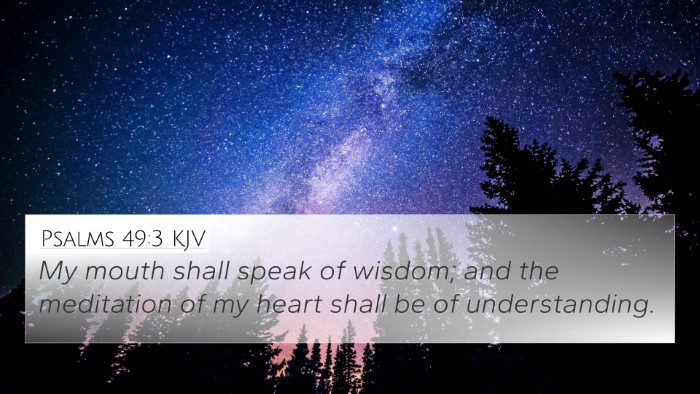Understanding Proverbs 8:6
Proverbs 8:6 states: "Hear; for I will speak of excellent things; and the opening of my lips shall be right things." This verse encapsulates the call to attentiveness and discernment, emphasizing wisdom's value and the nature of the speech that emanates from it.
Contextual Overview
The Book of Proverbs is rich in wisdom literature, primarily attributed to King Solomon. In this chapter, Wisdom is personified and speaks to humanity, offering guidance and insight.
Verse Meaning and Insights
- Call to Listen: The term "hear" signifies an urgent appeal for attention. It suggests that the wisdom offered is crucial and worthy of serious consideration.
- Excellence of the Message: The phrase "excellent things" implies that the teachings are not only valuable but of high moral and ethical standard, essential for living a righteous life.
- Integrity of Speech: "The opening of my lips shall be right things" emphasizes that what wisdom communicates is aligned with truth and righteousness, contrasting the deceitful words of folly.
Comparative Bible Verse Analysis
In examining Proverbs 8:6, several related verses provide further context and insight:
- Proverbs 1:5: "A wise man will hear, and will increase learning; and a man of understanding shall attain unto wise counsels." This verse underscores the idea that wisdom requires a willingness to listen and learn.
- James 1:19: "Wherefore, my beloved brethren, let every man be swift to hear, slow to speak, slow to wrath." This highlights the importance of being attentive and responsive in a righteous manner.
- Proverbs 4:5: "Get wisdom, get understanding: forget it not; neither decline from the words of my mouth." This verse stresses the pursuit of wisdom, paralleling the urgency presented in Proverbs 8:6.
- Matthew 12:34: "For out of the abundance of the heart the mouth speaketh." This verse correlates the nature of speech with inner values, reaffirming the righteousness of wisdom's speech.
- Proverbs 15:2: "The tongue of the wise useth knowledge aright: but the mouth of fools poureth out foolishness." This emphasizes the distinction between wise and foolish speech.
- Philippians 4:8: "Finally, brethren, whatsoever things are true, whatsoever things are honest, whatsoever things are just, whatsoever things are pure, whatsoever things are lovely, whatsoever things are of good report; if there be any virtue, and if there be any praise, think on these things." This New Testament exhortation aligns with the nature of "excellent things" mentioned in Proverbs 8:6.
- Proverbs 10:31: "The mouth of the just bringeth forth wisdom: but the froward tongue shall be cut out." This highlights the productive and edifying nature of wise speech.
Inter-Biblical Dialogue
Proverbs 8:6 not only stands alone but interacts with various themes found throughout Scripture. The wisdom being described enriches the understanding of God's character and His desire for humanity to seek out and uphold righteousness.
Tools for Bible Cross-Referencing
To explore these connections further, several resources are available:
- Bible Concordance: Useful for identifying terms and themes across different scriptures.
- Bible Cross-Reference Guide: A structured approach to exploring inter-connections between verses.
- Cross-Reference Bible Study: Methods of studying scriptures in relation to each other to draw deeper insights.
Conclusion
Proverbs 8:6 serves as a profound reminder of the importance of listening to the wisdom imparted through righteous speech. The cross-referenced verses illuminate the complex web of biblical wisdom that advocates for discernment, learning, and righteousness.
As one delves deeper, the connections between Proverbs 8:6 and other biblical texts foster a broader understanding of the theologies presented throughout Scripture.















